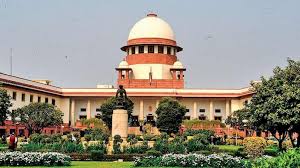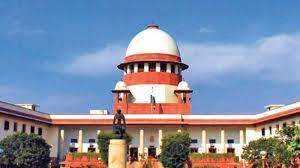The Supreme Court dismisses the idea of a ‘referendum’ on Jammu and Kashmir’s accession and Article 370. The court emphasizes the significance of the J&K Constituent Assembly, which uniquely framed the region’s constitution. The legal debate highlights the balance between central authority and regional autonomy in shaping the state’s fate.
Table of Contents
Supreme Court Rejects ‘Referendum’ Idea on J&K’s Article 370
On Tuesday, the Supreme Court made it unequivocally clear that any notion of a ‘referendum’ concerning Jammu and Kashmir’s accession or the application of the entire Constitution was out of the question. This statement arose in the context of the annulment of Article 370, which brought an end to the region’s 70-year-long special status and led to its division into two Union Territories on August 5, 2019.
The foundation of the Indian Union’s constitution necessitated the formation of a Constituent Assembly specifically for Jammu and Kashmir. This assembly would have the ultimate authority to decide the state’s position in terms of its accession, with the outcome becoming a permanent component of the Constitution. Quoting Abdullah, Sibal highlighted the intrinsic references made during the J&K CA debates to the ‘will of the people of J&K’. These references emphasized the state’s unique federal nature and its distinctive residual powers vested in the state assembly. This special status was even acknowledged under the broader framework of the Indian Constitution.
A pivotal moment during these proceedings was when J&K National Conference leader Mohd Akbar Lone invoked the concept of a ‘referendum’. This was intended to underscore his argument that the people’s wishes in Jammu and Kashmir were not taken into account before the abrogation of Article 370. It’s noteworthy that Article 370 had obtained permanent status following the lapse of the J&K Constituent Assembly in 1957. Lone’s legal representative, Kapil Sibal, presented a transcript of then chief minister Sheikh Abdullah’s speech from the J&K CA.
J&K’s Special Status: Supreme Court Dismisses ‘Referendum’ Proposition
The crux of the matter revolves around the intricate balance between the central Indian government and Jammu and Kashmir’s unique political status. The revocation of Article 370 prompted debates on whether the region’s residents should have been involved in the decision-making process, especially considering its historic and regional significance. The reference to a ‘referendum’ seeks to highlight the apparent lack of consultation or consensus from the local population, potentially raising questions about the legitimacy of the decision made by the central government.
The significance of the J&K Constituent Assembly’s role cannot be understated. This body was entrusted with the task of framing the state’s constitution and determining its future within the larger Indian Union. The annulment of Article 370 bypassed this historical process and led to a reconfiguration of Jammu and Kashmir’s political landscape. By citing Abdullah’s words, Sibal underscores the importance of acknowledging the ‘will of the people’ as a guiding principle in shaping the state’s destiny.

Constitutional Dynamics: Supreme Court Debates J&K’s ‘Referendum’ Concept
The distinctiveness of Jammu and Kashmir’s political setup is emphasized through the references to its federal nature and the powers retained by the state assembly. The region’s exceptional status was enshrined even within the Indian Constitution. This distinction set it apart from other states and made its political dynamics significantly different, with autonomy vested in its legislative body.
As the legal proceedings unfold, the juxtaposition of these arguments against the backdrop of the Supreme Court’s stance regarding the unfeasibility of a ‘referendum’ brings into focus the complexity of the situation. The court’s assertion, while rejecting the notion of a ‘referendum’, appears to underline the authority of constitutional processes in determining such significant changes to a region’s political status.
In conclusion, the ongoing legal discourse surrounding Jammu and Kashmir’s Article 370 revolves around the interplay between central authority and regional autonomy. The invocation of a ‘referendum’ and the emphasis on the ‘will of the people’ signal the contention that decisions with profound implications should reflect the collective sentiment of the affected populace. Yet, the Supreme Court’s assertion solidifies the role of constitutional mechanisms in shaping the trajectory of states within the Indian Union.












